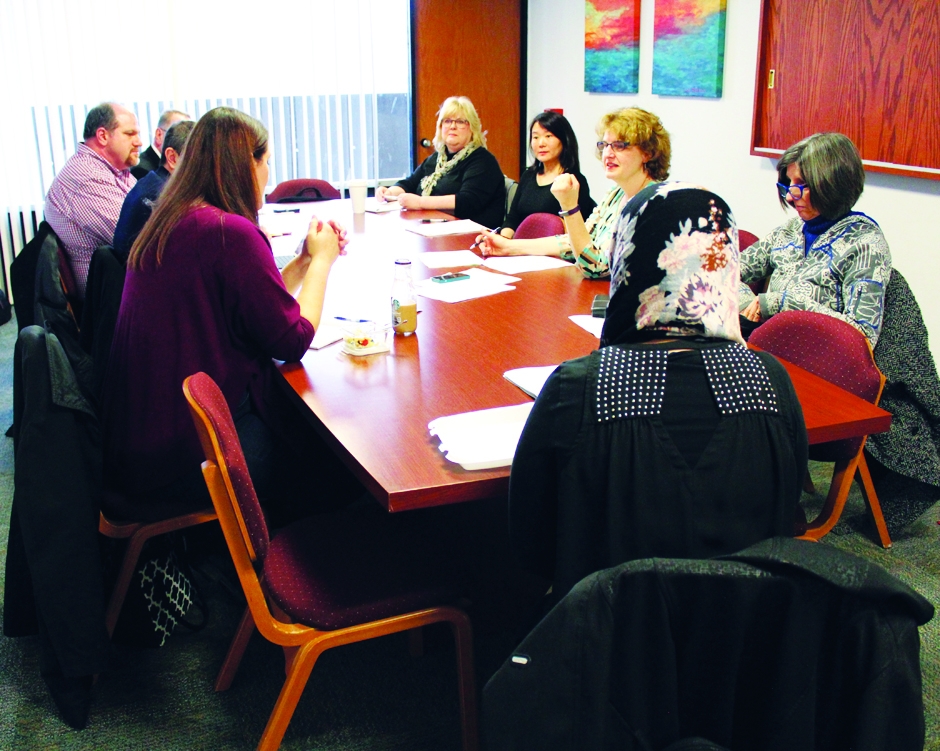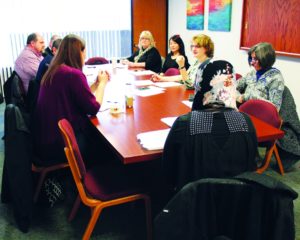
Educators gather in room 607 of the Union, Jan. 24 for a workshop focused on improving their teaching methods, hosted by the Center for Teaching Excellence.

Educators gather in room 607 of the Union, Jan. 24 for a workshop focused on improving their teaching methods, hosted by the Center for Teaching Excellence.
Liza Zulick | Staff Writer
On Jan. 23 and 24, Duquesne teachers participated in 30-minute workshops to discover better teaching strategies to make it easier for their students to learn.
The workshops, created by Duquesne’s Center for Teaching Excellence, are designed to help teachers change their teaching methods to allow students to learn more easily. Steven Hansen, associate director for faculty development of the Center for Teaching Excellence, designed the short workshops to make it easier to fit into teachers’ schedules.
“The thirty-minute workshops are a way to engage faculty without being a drain on their time or schedules,” Hansen said.
The workshops are designed to make small adjustments to teaching methods to help in making big connections to students learning, according to Hansen. This idea is based off of the book “Small Teaching: Everyday Lessons from the Science of Learning,” by James Lang, director of the Center for Teaching Excellence at Assumption College in Worcester, Massachusetts.
The micro workshops touch on major topics of teaching such as the transparent assignment design, which is what the workshops on Jan. 23 and 24 focused on. The transparent assignment design was created to allow teachers to find new ways to make assignments more clear to students. The classes were taught by Laurel Willingham-McLain, director of faculty development and teaching excellence.
“We were helping faculty be sure that they are clear when they give students assignments,” Willingham-McLain said.
Teachers who RSVP for the micro workshops attend these lessons during their lunch time. Other topics such as “Responding to Five Common Student Writing Struggles”, “Systematic Reviews: 5 Things You Need to Know” and “The Easy Way to Teach a Writing Intensive Course” will all be featured in upcoming workshops.
“University teachers grow and develop just like athletes and artists,” Hansen said. “We believe that teaching is an art that grows through scholarship, practice, reflection, and collaboration. The mini-workshops offer an opportunity for faculty to discover new research on teaching and apply it to their own teaching contexts.”
Although each student might have their own opinion on what works best in the classroom, each method taught is designed to allow all students different approaches to learning.
“I’ve always thought that more hands-on teaching strategies have helped me the best. For example, I learn much more doing worksheets in class dealing with real life problems than listening to lectures,” Rhett Wahler, a freshman physician assistant major, said.
The current workshops are designed only for teachers, but soon there will be a graffiti wall workshop that will also include students. According to Willingham-McLain, this workshop will allow students to share with teachers what strategies work best for them in hopes to allow teachers to understand studies from a student’s perspective.
Willingham-McLain believes that teachers should participate in the workshops because it “helps them bring their best selves to the classroom and to focus on the central parts of teaching and learning.”
“The point of this isn’t to dumb down the work, but to make it more rigorous for deeper learning they can really focus on,” she added.




